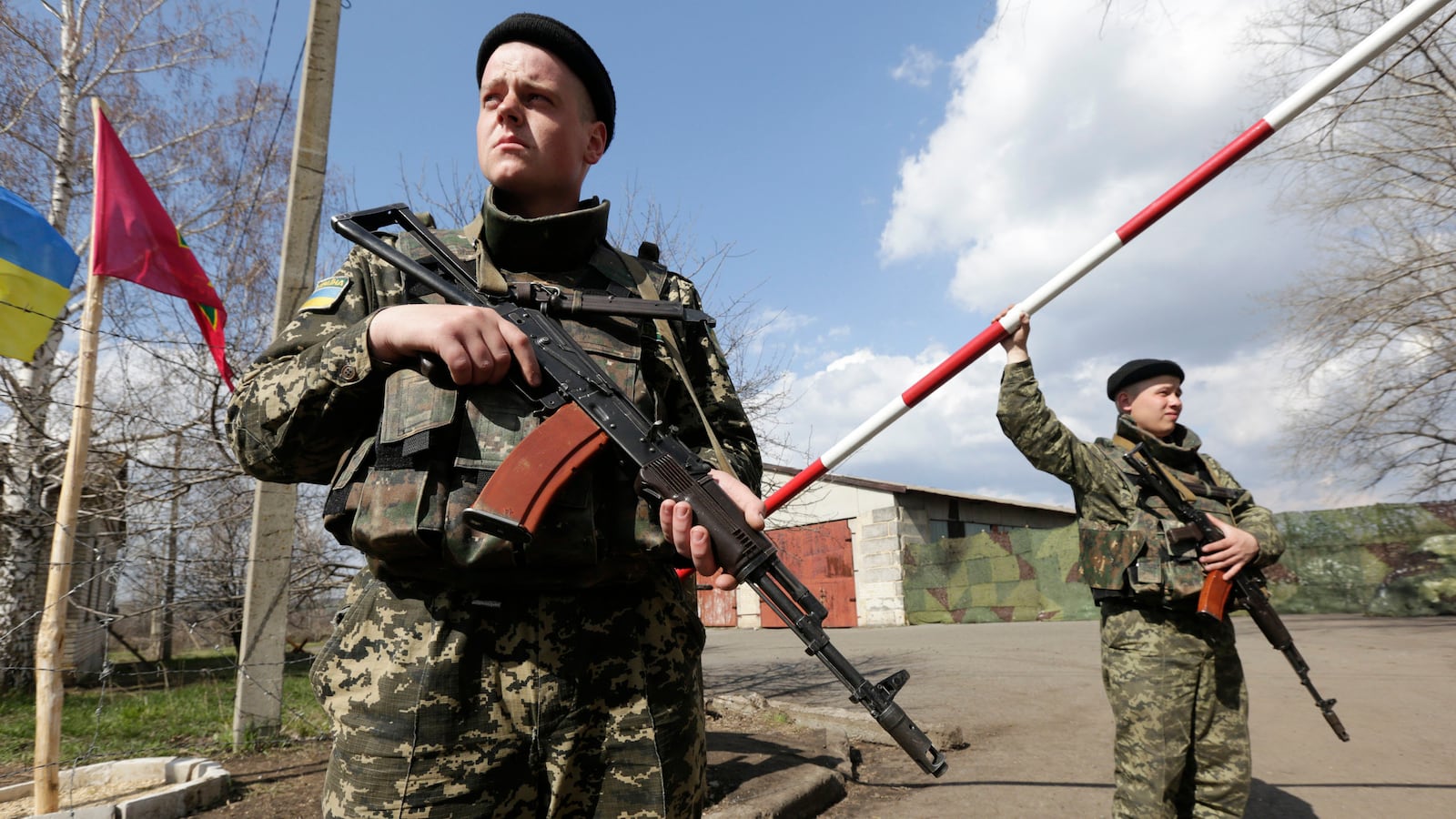DONETSK, Ukraine—Stroll along an allée of forsythia bushes in bright yellow bloom, take a look at groups of moms with strollers chatting on the veranda of Barberry restaurant, and you would hardly believe that around the corner hundreds of protestors gathered around rusty barricades with Russian flags and “USA Go Home!” signs were ready, they said, to die in a police onslaught. Spring is taking hold in Donetsk, the capital of Ukraine’s mining region, and, exhausted by living on the verge of what some here think will by a much wider, bloodier confrontation, the city longs for normality.

As if to underscore their fears, Russian President Vladimir Putin, told German Chancellor Angela Merkel on Tuesday that “the sharp escalation of the conflict” in Ukraine “has placed the country, in effect, on the verge of civil war.”
The talk of Donetsk revolves around the news that the Ukrainian army arrived in the region on Tuesday, and a guessing game as to whether the Russian military will invade to defend the pro-Russian movement that has taken government installations in several cities.
On Monday gunfights between the self-proclaimed People’s Republic of Donetsk fighters and police in the town of Sloviansk, north of here, left several people wounded and everybody in the 4.3 million population of the Donetsk region worried about tomorrow. More confrontations have been reported in Kramatorsk.
Here in Donetsk, Yelena and Svetlana, two girl-friends pushing baby carriages in the shadow of magnolia trees, seemingly far from the action, shared their concerns. “You see, I only wish that Kiev left us alone,” said soft-spoken Yelena, complaining about the overflights of Ukrainian aircraft that marked the beginning of “anti-terrorist” special operations. “We are a hard-working industrial city, we deserve to live peaceful lives. They sent military helicopters to Donetsk yesterday,” she said. “That frightened my baby.” Her red-haired friend Svetlana chimed in, “Between two evils we choose Russia.”
Why is Kiev evil? On the streets of Donetsk one comes across a huge bouquet of complaints. Two middle-aged Donbas region miners sitting on a bench in the Musical Park remembered the times when current authorities or their predecessors from the 2004 Orange Revolution had delayed monthly salary payments. Miners had joined the anti-Kiev protest to prevent the same leaders from coming to power.
Who would be a good pro-Russian leader? They did not know. But “Ukrainian authorities never improved life in Eastern Ukraine,” said Georgy Fyodorov, a miner from the town of Kirovskoye. “If you really want to understand why we take over state buildings, and fight, please pay attention: the average salary in Eastern Ukraine is $300-$400 dollars a month, that’s how much they pay pensioners in Russia.“ Those salaries, of course, were established under the former pro-Russian president, Viktor F. Yanukovych.
Beauticians at the Nail Art salon added two more complaints about language and history: authorities should stop making their children learn the Ukrainian language, especially at Russian schools. The salon’s hairdresser, Yelena Ivanova, and her two grown children participated in the storming of the state administration building on April 6, she said. Together they stood in a human chain hand in hand with other protesters chanting “Russia!” so loudly that two busses full of police turned around and left, Ivanova recalled.
That day, the protesters proclaimed the People’s Republic of Donetsk. “I don’t think they hear us in the West, when we try to explain the core ideological contradictions, that cannot be solved by shooting,” Ivanova insisted. “Half of Ukraine believes that Stepan Bandera was a hero and they won a revolution in Kiev under his flag.” (Bandera was a Ukrainian nationalist who tried to collaborate with the Nazis to win independence from the Joseph Stalin and the Soviet Union during World War II.) “We in the East of Ukraine believe he was a fascist—and even if NATO would bomb us we would not change our belief,” said Ivanova. “All our love for Kiev was poisoned by their revolution,” she concluded with a sigh.
In the meantime, the rebel militiamen were taking the blue and yellow trident, the Ukraine national coat of arms, off the Donetsk administration building. Protesters in military camouflage re-enforced the barricades. “We are expecting an attack from the Ukrainian military tonight and it is still unclear if Uncle Vova would help us out,” said Dmitry Mashutko, a field commander on the barricades. “Uncle Vova” is the nickname for Vladimir, as in Russian President Vladimier Putin. “This is not a joke any longer, we might be all dead by tomorrow morning,” Mashutko added gloomily. Both his parents had blessed him, their only son, for the defense of the People’s Republic, he said. Even his paralyzed father, a veteran of Afghanistan war, blessed what he was doing, he said.
The day was winding down. Up the street from the pro-Russian camp two schoolboys were throwing a red hat to each other outside a bilingual school, one of nine in the Voroshilovsky district of Donetsk that teaches mostly in the Russian language. Students volunteered to choose the language of study they wanted. In 2005 the school did not have any children interested in studying Ukrainian and this year there was a specialized Ukrainian class with 35 students. “Language has never been an issue, it is a made up reason used to explain Russian military intervention in our sovereign country,” said the school’s director, Svetlana Drozdova. Then she burst into tears.
At the beginning of the week Drozdova, who teaches history, had assigned short biographies of Stalin, Hitler and Bandera to her students. They are, after all, the three critical historical figures in today’s Ukraine. But her main concern was not the syllabus; it was her students’ safety. Drozdova believed that her lovely city of Donetsk, with its beautiful parks, clean streets and good people, deserved a peaceful life. She said she could not bear to see teenagers putting on balaclavas heading for the barricades.






